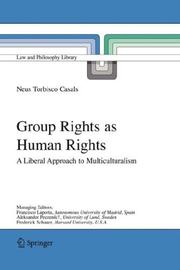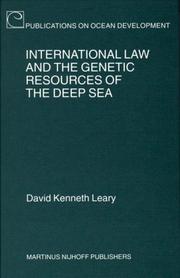| Listing 1 - 2 of 2 |
Sort by
|

ISBN: 1280624868 9786610624867 1402042094 1402042086 9048170737 Year: 2006 Volume: v. 75 Publisher: Dordrecht : Springer,
Abstract | Keywords | Export | Availability | Bookmark
 Loading...
Loading...Choose an application
- Reference Manager
- EndNote
- RefWorks (Direct export to RefWorks)
Liberal theories have long insisted that cultural diversity in democratic societies can be accommodated through classical liberal tools, in particular through individual rights, and they have often rejected the claims of cultural minorities for group rights as illiberal. Group Rights as Human Rights argues that such a rejection is misguided. Based on a thorough analysis of the concept of group rights, it proposes to overcome the dominant dichotomy between "individual" human rights and "collective" group rights by recognizing that group rights also serve individual interests. It also challenges the claim that group rights, so understood, conflict with the liberal principle of neutrality; on the contrary, these rights help realize the neutrality ideal as they counter cultural biases that exist in Western states. Group rights deserve to be classified as human rights because they respond to fundamental, and morally important, human interests. Reading the theories of Will Kymlicka and Charles Taylor as complementary rather than opposed, Group Rights as Human Rights sees group rights as anchored both in the value of cultural belonging for the development of individual autonomy and in each person’s need for a recognition of her identity. This double foundation has important consequences for the scope of group rights: it highlights their potential not only in dealing with national minorities but also with immigrant groups; and it allows to determine how far such rights should also benefit illiberal groups. Participation, not intervention, should here be the guiding principle if group rights are to realize the liberal promise.
Ethnic groups --- Human rights --- Multiculturalism --- Legal status, laws, etc. --- Philosophy. --- Cultural diversity policy --- Cultural pluralism --- Cultural pluralism policy --- Ethnic diversity policy --- Social policy --- Anti-racism --- Ethnicity --- Cultural fusion --- Ethnic identities --- Ethnic nations (Ethnic groups) --- Groups, Ethnic --- Kindred groups (Ethnic groups) --- Nationalities (Ethnic groups) --- Peoples (Ethnic groups) --- Ethnology --- Government policy --- Political science --- Public law. --- Theories of Law, Philosophy of Law, Legal History. --- Political Philosophy. --- Public Law. --- Law --- Political philosophy --- Law—Philosophy. --- Law. --- Political philosophy. --- Public law . --- Acts, Legislative --- Enactments, Legislative --- Laws (Statutes) --- Legislative acts --- Legislative enactments --- Jurisprudence --- Legislation

ISBN: 9004155007 9786611457952 143565806X 1281457957 9047418786 9047425553 Year: 2007 Publisher: Leiden ; Boston : Martinus Nijhoff,
Abstract | Keywords | Export | Availability | Bookmark
 Loading...
Loading...Choose an application
- Reference Manager
- EndNote
- RefWorks (Direct export to RefWorks)
Deep-sea genetic resources and the interest of the biotechnology industry in their exploitation are emerging as a significant challenge for international oceans governance. Focusing on the ecosystems associated with deep-sea hydrothermal vents in areas beyond national jurisdiction this book examines a range of emerging activities in the deep sea including bioprospecting, marine scientific research, mining and tourism and considers the effectiveness of existing international law and governance mechanisms to sustainably manage these activities. It includes a detailed examination of the nature and extent of bioprospecting in the deep sea and its relationship with other activities such as marine scientific research. The book sets out in detail suggestions for how international law and policy regimes could respond to these challenges. As the first detailed study on this issue it will be useful reference for academics, diplomats, economists, scientists and policy makers alike.
Marine sciences --- Ocean bottom --- Hydrothermal vent ecology. --- Germplasm resources conservation --- Ocean bottom (Maritime law) --- Law of the sea --- Hydrothermal vents --- Deep-sea ecology --- Hot spring ecology --- Research --- Law and legislation. --- Ecology
| Listing 1 - 2 of 2 |
Sort by
|

 Search
Search Feedback
Feedback About UniCat
About UniCat  Help
Help News
News